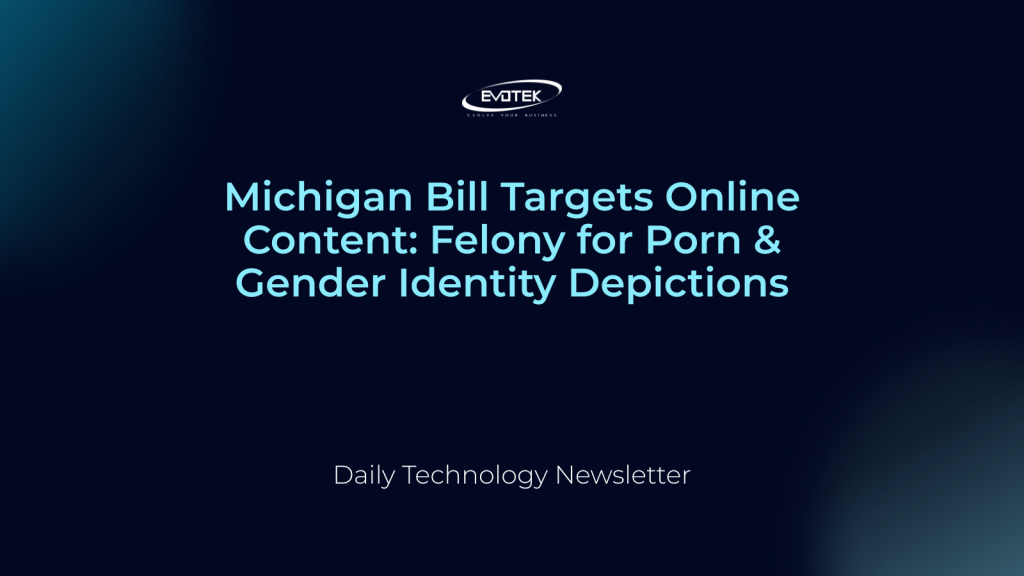A new legislative effort in Michigan aims to drastically reshape the online landscape for its residents. House Bill No. 4938, introduced by Representatives Schriver, Pavlov, Maddock, DeSana, Fox, and Wortz, proposes a comprehensive ban on what it terms “prohibited material” distributed on the internet. Dubbed the “anticorruption of public morals act,” the bill seeks to impose severe penalties, including lengthy prison sentences and substantial fines, for violations.
Broad Definitions and Strict Prohibitions
The proposed legislation, introduced on September 11, 2025, sets forth expansive definitions for material deemed unlawful. “Pornographic material” is broadly defined as any digital content – videos, erotica, AI-generated material, live feeds, or sound clips – primarily intended for sexual arousal or gratification.
However, the bill’s most contentious aspect lies within its definition of “prohibited material,” which includes:
- Explicit depictions of sexual acts such as intercourse, fellatio, cunnilingus, masturbation, ejaculation, group sex, bondage, and acts involving bodily fluids for sexual arousal.
- Erotic autonomous sensory meridian response (ASMR) content, moaning, or sensual voice content.
- Animated, virtual, or AI-generated sexual activity.
- Depictions of characters acting or resembling minors in sexual contexts.
- Crucially, the bill also targets material depicting a “disconnection between biology and gender by an individual of 1 biological sex imitating, depicting, or representing himself or herself to be of the other biological sex by means of a combination of attire, cosmetology, or prosthetics, or as having a reproductive nature contrary to the individual’s biological sex.”
Exemptions are narrowly limited to material used for scientific, medical research, instruction, or peer-reviewed academic content.
Severe Penalties for Non-Compliance
The “anticorruption of public morals act” outlines stringent punishments:
- Any commercial entity, public institution, private actor, or internet platform knowingly distributing or making available prohibited material to individuals in Michigan could face a felony charge, punishable by up to 20 years in prison or a $100,000 fine, or both.
- For violations involving more than 100 pieces of prohibited material, penalties escalate to up to 25 years imprisonment or a $125,000 fine.
- Commercial entities or internet service providers (ISPs) that facilitate access to prohibited material face an additional civil fine of up to $500,000 for each violation.
- The promotion or sale of “circumvention tools” – defined as software or services like VPNs designed to bypass internet filtering – is also explicitly prohibited.
Mandatory Filtering and Content Moderation
The bill places significant new responsibilities on internet service providers and online platforms:
- ISPs operating in Michigan would be mandated to implement filtering technology to prevent access to prohibited material and actively monitor and block known circumvention tools. They would also be required to block specific websites upon receipt of a valid court order.
- Internet platforms, websites, and social media services accessible in Michigan must update their terms of service to prohibit hosting, promotion, or linking to prohibited material. They would need to implement robust content moderation tools, including AI-driven filtering, human review teams, and a public reporting mechanism with a 2-business-day response time for law enforcement-flagged content.
- These platforms must provide an annual transparency report to the Department of State Police detailing compliance and enforcement actions. Moderation systems must operate 24/7 without user override and utilize real-time scanning, keyword analysis, and image recognition.
- A “trusted flagger program” would be established, granting law enforcement and designated organizations priority in reporting prohibited material, requiring immediate response and removal procedures within two business days.
New Enforcement Division and Funding
To oversee and enforce this act, the Department of Attorney General would establish a special “internet content enforcement division.” This division would:
- Investigate and prosecute violations.
- Conduct audits of ISPs and platforms to ensure compliance.
- Coordinate with federal and international law enforcement.
- Manage a public reporting system for residents to submit complaints.
- Issue legally binding takedown orders, requiring content removal within two business days. Failure to comply with a takedown order would incur a civil fine of $250,000 per day of delay.
The division would be staffed with digital forensics analysts, legal experts, cybersecurity specialists, and investigators. Furthermore, a new fund would be created in the state treasury, financed by civil fines collected under the act, to cover administration and enforcement costs.
Effective Date
The act is slated to take effect 90 days after its enactment into law, but it is contingent on the passage of another related bill, House Bill No. ____ (request no. H03698’25), of the 103rd Legislature.

 日本語
日本語 한국어
한국어 Tiếng Việt
Tiếng Việt 简体中文
简体中文